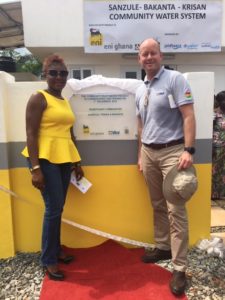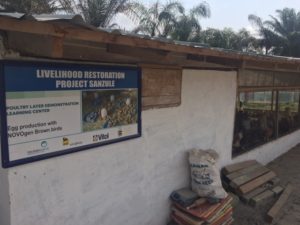In January 2015, Eni, Vitol and Ghana National Petroleum Corporation (GNPC) signed an agreement with the national authorities for the development of an integrated oil and gas project, Offshore Cape Three Points (OCTP), helping to provide the necessary energy to speed up the economic growth of the country.
To help communities affected by and in the vicinity of the OCTP project, Vitol, Eni and GNPC are committed to a Community Investment Strategy which empowers local communities to control their own development. The first such project to be completed under this strategy is a water project. This provides potable water to three communities; Sanzule, Bakanta and Krisan in the vicinity of OCTP and at a nominal cost to provide a sustainable and affordable solution, supplying clean fresh water to the communities.
Water is treated to WHO standards and provided from outlets in the three communities. The project has been designed to minimise the environmental impact on the communities with a fully solar powered 1000l/hr purification system and is substantially cheaper than bottled or sachet water and without the plastic waste. This project has been constructed by the Jaldhaara Foundation, an NGO committed to providing safe water, sanitation and hygienic practices in unaddressed, isolated and marginalized communities of the world.

Along with the Community Investment Strategy, it was agreed that project affected people from the local communities would be supported to develop new livelihoods, improving prosperity and opportunity for the communities. The OCTP project is implementing a Livelihood Restoration Programme (LRP), with a $2.2 million USD commitment, for those that were affected. These families livelihoods were based on predominantly agricultural and fisheries based activities and the LRP has enabled all 205 project affected people to choose from a number of opportunities for which they have received training, which will continue for three years, and starter packs to get their businesses up and running. The LRP is being implemented by Technoserve, a nonprofit that connects communities and market opportunities, which has set up and runs a local office in Sanzule.

In order to maximise the chance of a better livelihood, a diverse range of opportunities to develop skills have been provided. The options the families have to explore include; aquaculture (fish ponds), livestock (pigs, goats, chickens), cropping (cassava, maize, green house), value additions (feed mill), vocational training (food vending, masonry, welding, carpentry, shoe making, soap making, hair dressing, bakery and dress making) and sea fishing (cold storage, fish processing).
Vitol and its partners in the OCTP project are committed to developing opportunities for communities to improve their livelihoods and ensure a better quality of life for future generations.